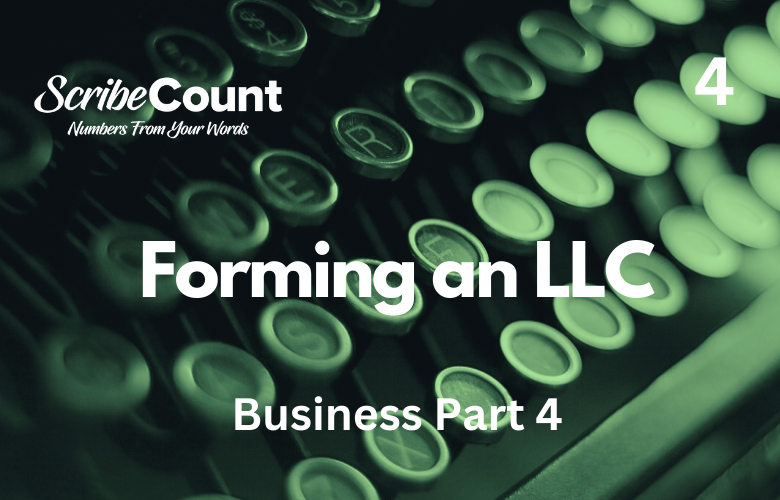How to Form an LLC for Self-Published Authors: A process outline.
Self-publishing offers writers unparalleled creative freedom, allowing them to retain full control over their work. However, with this autonomy comes the responsibility of managing the business side of publishing. Many self-published authors find that forming a Limited Liability Company (LLC) is an excellent way to establish a legal entity for their publishing imprint. An LLC provides liability protection, tax advantages, and professional credibility. This article outlines the basic steps to forming an LLC tailored specifically to self-published authors looking to build their own publishing brand. We'll go into HOW to perform each step in the following articles.
Choosing a Name for Your LLC
Selecting a name for your LLC is the first step in establishing your publishing imprint. This name should reflect your brand identity while complying with state regulations. Each state has specific naming rules, often requiring that an LLC name be unique and include a designation such as "LLC" or "Limited Liability Company."
To ensure your chosen name is available, conduct a search through your state’s business entity database. It’s also wise to check for domain name availability if you plan to establish a website for your imprint. Since branding is essential in publishing, consider securing social media handles that align with your LLC’s name to maintain consistency across platforms.
Selecting a State
When deciding where to form your LLC, consider your business's location, tax implications, and potential future needs, as different states offer varying benefits and requirements.
Selecting a Registered Agent, Address, and Phone Number
A registered agent is a critical component of an LLC. This individual or business entity receives legal documents and government correspondence on behalf of your LLC. Most states require a registered agent who resides in the state where the LLC is formed. Some self-published authors choose to serve as their own registered agent, but hiring a professional registered agent service ensures privacy and compliance with state regulations, especially if the author frequently travels or resides in a different state.
Selecting a Management Structure
For an author's LLC, you can choose between a member-managed (where all members are involved in decision-making) or a manager-managed structure (where a designated manager handles operations and decisions). Consider your level of involvement, potential growth, and tax implications when making your decision
Filing Articles of Organization
To officially create your LLC, you must file Articles of Organization with your state's Secretary of State office. This document typically includes essential information such as:
The LLC’s name
The registered agent’s name and address
The business purpose (which can be as simple as "publishing books and related content")
The names of the LLC’s members (owners)
Each state has its own filing requirements and fees, which can range from $50 to several hundred dollars. Some states offer online filing, making the process quick and straightforward.
Drafting an Operating Agreement
Although not always legally required, an Operating Agreement is highly recommended for LLCs. This document outlines the structure and operating procedures of your LLC, including:
Ownership percentages (if you have multiple members)
Distribution of profits and losses
Decision-making protocols
Procedures for adding or removing members
For a self-published author operating as a single-member LLC, the Operating Agreement can serve as an internal guideline, reinforcing the separation of personal and business assets. It is also useful when dealing with financial institutions, as banks may require it to open a business account.
Obtaining an EIN from the IRS
An Employer Identification Number (EIN) is necessary for tax purposes and is used to open business bank accounts. Even if you don’t have employees, an EIN separates your business identity from your personal Social Security number, providing added security and professionalism.
The IRS issues EINs for free, and the application process is simple. You can apply online through the IRS website and receive your EIN immediately. This number is essential for filing taxes, applying for business credit, and hiring employees should you expand your publishing operations.
Opening a Business Bank Account
To maintain financial separation between personal and business expenses, it’s crucial to open a dedicated business bank account. Most banks require the following documents to set up an account:
Your LLC’s Articles of Organization
Your EIN
Your Operating Agreement (if applicable)
A government-issued ID
A business bank account simplifies bookkeeping, making it easier to track publishing-related income and expenses. It also enhances credibility when working with retailers, vendors, and service providers.
Understanding Tax Requirements
LLCs offer flexible tax structures, allowing self-published authors to choose how their business is taxed. By default, a single-member LLC is considered a "disregarded entity," meaning the IRS treats it as a sole proprietorship for tax purposes. Profits and losses pass through to the owner’s personal tax return. However, LLCs can also elect to be taxed as an S corporation, which may offer tax benefits depending on income levels.
Self-published authors should also be aware of sales tax obligations, especially if selling books directly through a personal website. Some states require businesses to collect and remit sales tax, so researching state-specific regulations is crucial.
Maintaining Compliance and Annual Requirements
Once your LLC is formed, ongoing compliance is necessary to keep it in good standing. Many states require LLCs to file an annual report and pay renewal fees. Failure to do so can result in penalties or dissolution of the LLC.
Additionally, keeping detailed financial records is essential. Proper bookkeeping practices ensure compliance with tax laws and help in case of an audit. Using accounting software or hiring a professional accountant can simplify this process.
Protecting Intellectual Property
Since a self-published author’s business revolves around intellectual property, protecting it should be a priority. While an LLC provides legal separation, it does not automatically protect copyrights or trademarks. Registering copyrights with the U.S. Copyright Office ensures legal ownership of your books, while trademarking your imprint’s name and logo can prevent others from using a similar brand.
Expanding Your Publishing Business
An LLC provides the foundation for growth, allowing self-published authors to expand their business beyond their own books. With a formal business structure in place, you can:
Publish books by other authors under your imprint
Offer publishing services, such as editing or formatting
Distribute books to retailers and libraries more effectively
Growth opportunities are limitless once the groundwork of forming an LLC is complete. With a strong legal and financial structure, authors can focus on what they do best—writing and publishing impactful stories.
There are several additional steps involved in forming an LLC. We've mentioned the main ones here and will delve into the complete process (in order) in the remaining articles in this section.
Conclusion
Forming an LLC as a self-published author is a strategic step in transforming a writing career into a sustainable business. The process involves choosing a name, designating a registered agent, filing necessary paperwork, and maintaining compliance with state regulations. While the initial setup requires time and effort, the benefits of liability protection, tax flexibility, and professional credibility make it a worthwhile investment.
By taking these steps, self-published authors can establish a strong foundation for their publishing imprint, ensuring long-term success in the competitive world of independent publishing.

